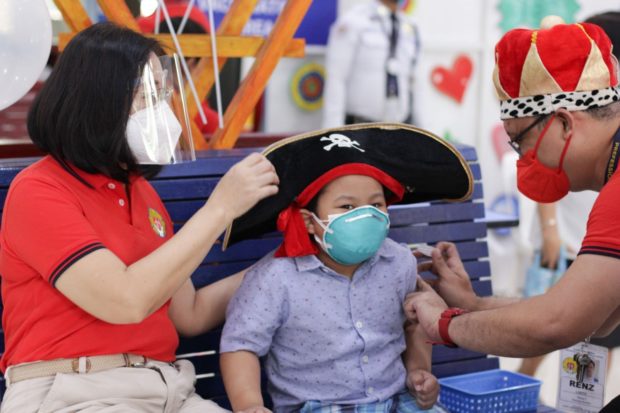Gov’t to review WHO advice to extend interval of primary vaccine doses on minors
MANILA, Philippines — The government will look into the basis of the World Health Organization’s recommendation to extend the interval of COVID-19 vaccine primary doses for minors, a vaccine expert said Wednesday.
Currently, the interval for the first and second dose of Pfizer’s COVID-19 vaccine for minors aged five to 17 is at least three weeks.
Dr. Nina Gloriani, chairperson of the country’s Vaccine Expert Panel, said that the World Health Organization released a recommendation that the interval could be four to eight weeks.
“‘Yung (The) longer interval that is known, we have known that a longer interval will give better immune responses,” she said during a media forum, noting that the Philippines shortened the interval of primary series and booster shots from six months to three months due to the threat of the Omicron variant.
“Now, for this particular issue, so maybe we can consider it but we have to review the data that they have na mayroon pala talaga silang study na ‘pag binigay after eight weeks or two months ay better ang immune response. We have not seen that [WHO data,]” she added.
(Now, for this particular issue, maybe we can consider it but we have to review the data that they have a study showing that if the second dose is given after eight weeks or two months, the immune response is better.)
Gloriani likewise said that they will have to review the study that shows a longer interval between the first and second dose could reduce the chance of Multisystem Inflammatory Syndrome in children (MIS-C).
“But they were also looking at ‘yung (the) reducing the chance of MIS-C by giving a longer interval for the second dose. But, we still have to see those data. Why not? We may have to reconsider but right now, it is three weeks at least or four weeks,” she said.
“Actually, better para sa akin talaga (for me, it is) better ‘yung (if) at least four weeks and then a little longer but not too long because we also want the booster to come in quickly,” she continued.
Earlier, an official of the Philippine Medical Association said that MIS-C could be a long-term effect of COVID-19 infection among children. However, it is rare, said Gloriani.
On the other hand, Dr. Wilda Silva said that the two doses of Pfizer’s vaccine for children are 91 percent effective against MIS-C.
To date, only Pfizer’s COVID-19 vaccine has been authorized to be used on children aged five to 11.
For 12- to 17-year olds, Moderna and Pfizer could be administered.
